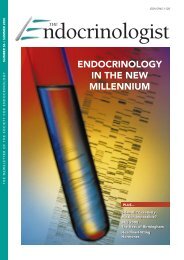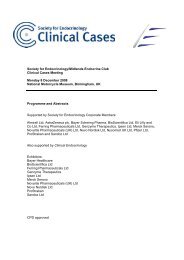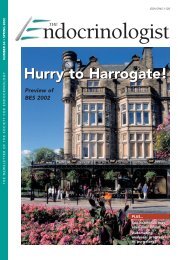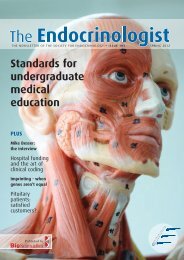Download issue 100 (pdf) - Society for Endocrinology
Download issue 100 (pdf) - Society for Endocrinology
Download issue 100 (pdf) - Society for Endocrinology
Create successful ePaper yourself
Turn your PDF publications into a flip-book with our unique Google optimized e-Paper software.
The new<br />
Royal<br />
Victoria<br />
Hospital<br />
building<br />
all aboard <strong>for</strong>... Belfast<br />
Writing in 1934 the novelist George Birmingham remarked ‘I was born in Belfast and brought up to believe,<br />
like St Paul, I am a citizen of no mean city’. Tarsus on the Lagan grew from a small commercial port serving<br />
the needs of a rural economy, to become, by the beginning of the 20th century, the leading industrial city in<br />
Ireland and a powerhouse of British manufacturing. Industrial decline accelerated after the Second World<br />
War, and the eruption of intercommunal strife in 1968 brought terrible human and economic costs. As<br />
memories of those days fade, Belfast has emerged as a vibrant city of culture and enterprise.<br />
The first physician to develop a<br />
specialist interest in endocrine<br />
diseases in Belfast was Professor<br />
Desmond Montgomery. He was<br />
joined by Professor David<br />
Hadden and Dr John Weaver<br />
in the newly established<br />
Metabolic Unit, a<br />
purpose built facility<br />
opened in 1957 on<br />
the Royal Victoria<br />
Hospital site combining<br />
inpatient beds, an<br />
outpatient suite and<br />
laboratory facilities. As expansion<br />
and rebuilding took place it has not been<br />
possible to maintain this close physical integration of<br />
all facilities; however, the close functional linkages<br />
built up by these early pioneers remain in place as<br />
essential features of endocrinology in Belfast.<br />
Clinical interactions and networking<br />
Desmond Montgomery’s successor Professor Brew<br />
Atkinson was a major influence in the redevelopment of<br />
the Royal Victoria Hospital site and the new Regional<br />
Centre <strong>for</strong> <strong>Endocrinology</strong> and Diabetes which opened in<br />
2003. This comprises an outpatient and day patient<br />
facility with a small clinical research suite. Endocrine and<br />
diabetes inpatient beds are in the same building.<br />
All consultants in the Regional Centre are engaged in both<br />
general endocrine and diabetes practice, within which<br />
they have their own areas of special interest. As well as<br />
traditional organ-based endocrine sub-specialisation with<br />
separate endocrine hypertension, thyroid and<br />
pituitary/adrenal clinics, diabetes secondary care has<br />
become increasingly sub-specialist with the development<br />
of pump, foot and renal diabetes clinics. Multidisciplinary<br />
working is well established, and community-based<br />
networking is developing rapidly in diabetes.<br />
16 T H E E N D O C R I N O L O G I S T • I S S U E 1 0 0 • S U M M E R 2 0 1 1<br />
Endocrinologists continue to be <strong>for</strong>tunate in having<br />
nearly all of the related specialties necessary to run a<br />
comprehensive endocrine service on a single Royal<br />
Victoria Hospital site. Thus Mr Stephen Cooke in the<br />
Regional Neurosurgery Unit carries out all of the pituitary<br />
surgery, Dr Peter Ellis undertakes all aspects of endocrine<br />
radiology including adrenal vein and petrosal sinus<br />
sampling, and Dr Fiona Eatock has just been appointed<br />
in endocrine surgery. Also on the same site are<br />
paediatric endocrinology, ophthalmology, vascular<br />
surgery, the Royal Jubilee Maternity Hospital and the<br />
Regional Fertility Unit. There are well established joint<br />
clinics in transition diabetes, antenatal care <strong>for</strong> diabetes,<br />
gynaecological endocrinology and other endocrine<br />
conditions. Endocrine cancers are considered at a<br />
multidisciplinary meeting, and there is a separate joint<br />
clinic and multidisciplinary meeting <strong>for</strong> neuroendocrine<br />
tumours. Specialist renal services are based at the nearby<br />
Belfast City Hospital.<br />
This concentration of clinical facilities has been of major<br />
benefit in the care of complex endocrine cases. Equally,<br />
however, the in<strong>for</strong>mal network of excellent<br />
endocrinologists at other hospitals in Belfast (including the<br />
nearby Belfast City and Mater Infirmorum Hospitals, which<br />
with the Royal Victoria Hospital are part of the same Trust)<br />
and the rest of Northern Ireland has streamlined central<br />
referral of more complex conditions, and enabled the<br />
continued peripheral management of many others.<br />
Training<br />
All undergraduate students from the Queen’s University<br />
Belfast medical school do a one week attachment in<br />
endocrinology/diabetes at the Royal Victoria Hospital<br />
during their third year. A further week is spent at one of<br />
the teaching hospitals attached to Queen’s where<br />
teaching and learning in diabetes and benign thyroid<br />
disease is consolidated. Undergraduate education is<br />
coordinated by Dr Karen Mullan, who also provides a<br />
student selected module <strong>for</strong> more in-depth study.<br />
The training of specialist registrars, under the Training<br />
Programme Director Dr Steven Hunter, has benefited<br />
from the good working relations between central and<br />
more peripheral units to ensure a balance of training<br />
opportunities. Twelve Specialist Trainee positions are<br />
available, with trainees usually spending one to two years<br />
at the Royal Victoria Hospital and three to four years at<br />
other sites. At any time two or three trainees may be out<br />
of programme in research or other training. There is a<br />
regular programme of teaching days in endocrinology<br />
and general internal medicine, including a joint training<br />
day with colleagues from the Republic of Ireland.


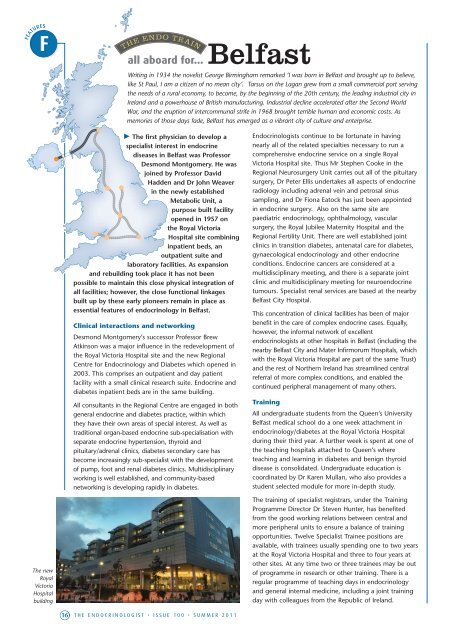
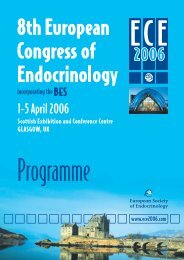
![The Endocrinologist | Issue 99 [PDF] - Society for Endocrinology](https://img.yumpu.com/48213777/1/184x260/the-endocrinologist-issue-99-pdf-society-for-endocrinology.jpg?quality=85)
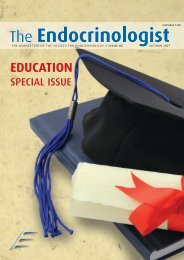
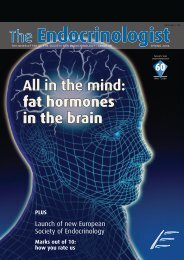
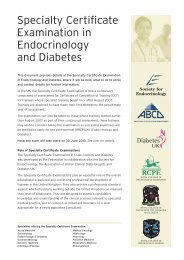
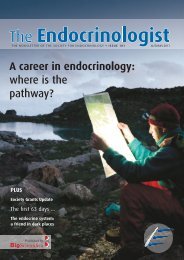
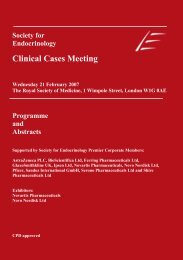

![The Endocrinologist | Issue 97 [PDF] - Society for Endocrinology](https://img.yumpu.com/40840065/1/184x260/the-endocrinologist-issue-97-pdf-society-for-endocrinology.jpg?quality=85)

